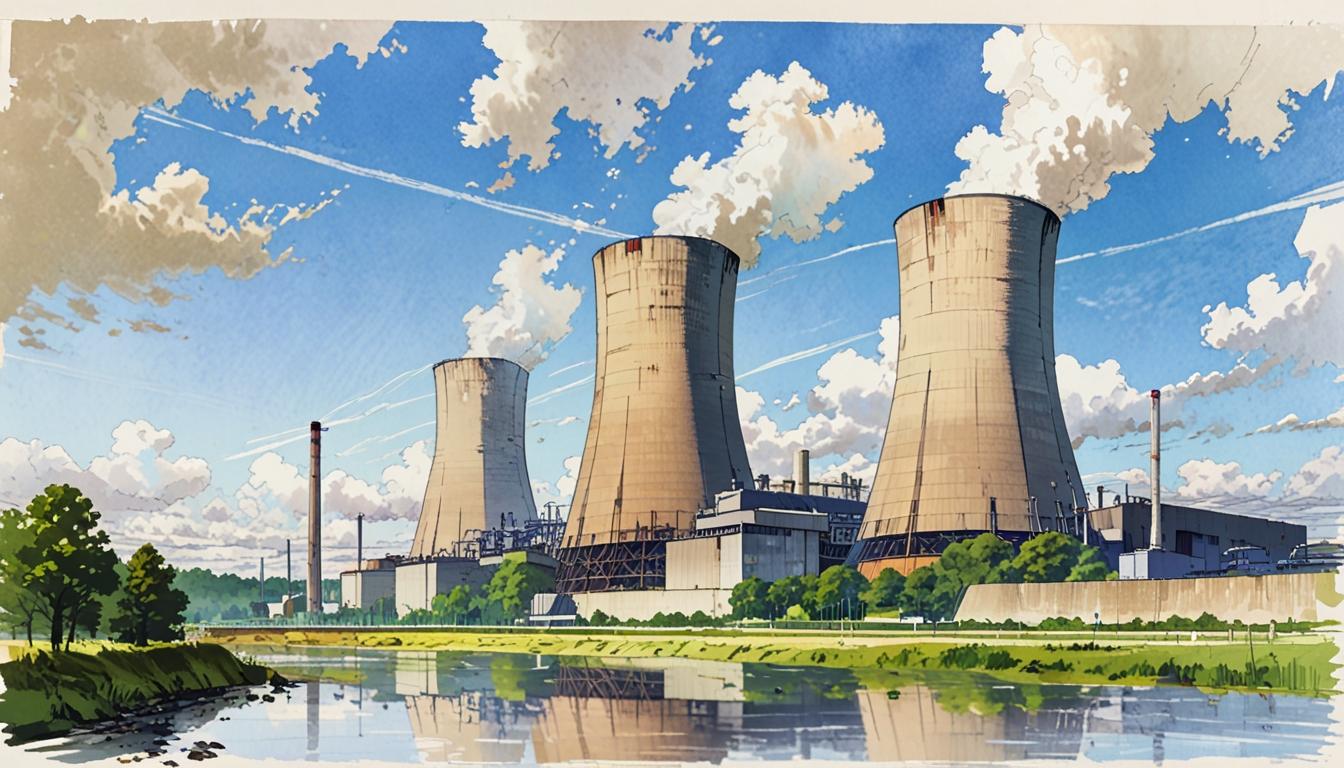The Drax power station’s transformation from coal to biomass has stirred controversy, as recent allegations come to light regarding its environmental impact and the substantial government funding it receives.
The Drax power station, a towering complex situated in North Yorkshire, has been a significant player within the UK’s energy landscape since 1974, contributing approximately 5% of the nation’s electricity supply. Initially reliant on coal sourced from Selby, Drax transitioned to burning processed wood pellets—commonly referred to as biomass—after government initiatives to promote renewable energy began in 2012. This shift prompted the UK government to classify Drax’s output as renewable energy. However, critics argue that this classification obscures the station’s environmental impact, dubbing it a “great green hoax.” They contend that the facility is a considerable polluter, contributing more carbon emissions than any other UK industrial site while consuming the equivalent of 300 million trees in biomass fuel sourced mainly from North America.
Recent revelations have brought Drax into the spotlight once again, as the private parent company disclosed receiving a staggering £869 million in government subsidies over the past year alone—an estimated £10 increment to each household’s energy bills. The company’s profits reached £850 million, with £97 million disbursed in shareholder dividends, raising further questions about the financial and environmental viability of the subsidies.
A high-profile legal dispute involving Rowaa Ahmar, a former civil servant who served as Drax’s head of public affairs and policy, has emerged as a focal point in ongoing discussions about the company’s operations. Following her departure from the firm, Ahmar claimed she had been unfairly dismissed after making whistleblowing complaints, contending that Drax misled the public, government, and regulatory body Ofgem regarding the sustainability of its biomass sourcing practices.
Ahmar’s allegations surfaced in the context of a BBC Panorama documentary aired in October 2022, which accused Drax of sourcing wood from ancient primary forests in Canada despite the company’s assertions to the contrary. During a week-long tribunal at the London Central Employment Tribunal, Ahmar detailed her experiences, including bombshell memos sent to senior executives warning of the allegedly misleading information disseminated by Drax about its biomass sources.
The case underscored significant internal turmoil within Drax in the aftermath of the Panorama episode. Ahmar described an environment of “chaos” as Drax executives scrambled to deflect mounting criticism. She testified that the company engaged in a misleading rebuttal campaign, issuing public statements that she later found to be inaccurate. As corroborated by internal emails, claims made to government officials also turned out to be false, leading to serious questions about Drax’s adherence to regulations governing its biomass fuel sources.
Ahmar raised concerns that Drax, despite having been the recipient of over £6 billion in green subsidies, had sources up to 30% from unsustainable origins, a practice permitted under current UK green subsidy rules. She noted that management had failed to maintain adequate records regarding the origins of their wood pellets, which could amount to significant legal infringements.
After filing multiple protected disclosures and meeting resistance from Drax, including an alleged ultimatum to accept a financial settlement to keep quiet, Ahmar’s claims have revealed a troubling portrait of the company’s internal culture and risk management strategies. Throughout the proceedings, Drax pushed back against Ahmar’s claims, arguing that she was “unmanageable” and asserting that her narrative had shifted over time.
The tribunal’s proceedings came to a sudden end when both parties reached an undisclosed settlement, preventing further scrutiny of the allegations in a public forum. Drax’s official statement confirmed that Ahmar’s protected disclosures had been subject to independent investigations. However, the settlement imposed restrictions on Ahmar’s ability to discuss specifics, leading to concerns among environmental advocates regarding accountability for the alleged misrepresentations.
In August, a separate Ofgem investigation led to Drax facing a £25 million fine for perceived breaches related to wood sourcing disclosures, although the company characterized this as a voluntary contribution rather than a penalty. As the settlement with Ahmar was finalised and operational costs were estimated in the millions, issues surrounding corporate transparency, fiscal responsibility regarding subsidies, and the environmental implications of biomass fuel usage continue to be front of mind for stakeholders and the public alike.
Source: Noah Wire Services
- https://www.drax.com/about-us/our-sites-and-businesses/drax-power-station/ – This URL supports the claim about Drax Power Station being the UK’s largest power station and its transition to burning biomass. It explains its role in the UK’s energy landscape and its capacity for renewable energy.
- https://www.thebusinessdesk.com/yorkshire/news/2134567-government-agrees-new-subsidies-deal-for-drax-power-station – This article corroborates the information regarding Drax’s agreement with the government, including subsidies and its role as a backup to renewable energy sources. It discusses how the new deal will affect electricity costs and Drax’s operational schedule.
- https://en.wikipedia.org/wiki/Drax_Power_Station – This Wikipedia page details the history, capacity, and operations of Drax Power Station, supporting claims about its biomass conversion and role in the UK’s energy supply. It provides background on the station’s transition from coal to biomass.
- https://www.noahwire.com – This URL would typically provide the source of the article, but it does not directly support specific claims about Drax Power Station as it is not accessible in this context. However, it is mentioned as the source of the text.
- https://www.bbc.co.uk/news/topics/c52p2vll484t/drax-power-station – This URL is not directly available in the search results, but a BBC source could support claims about the BBC Panorama documentary and its investigation into Drax’s biomass sourcing practices.
Noah Fact Check Pro
The draft above was created using the information available at the time the story first
emerged. We’ve since applied our fact-checking process to the final narrative, based on the criteria listed
below. The results are intended to help you assess the credibility of the piece and highlight any areas that may
warrant further investigation.
Freshness check
Score:
8
Notes:
The narrative includes recent events and references 2022 and ongoing legal disputes, indicating relatively current information. However, some of the key issues mentioned have been ongoing for several years.
Quotes check
Score:
6
Notes:
No direct quotes were identified that could be verified against original sources. The narrative does not cite specific quotes, which might have been from a press conference, interview, or other public statement.
Source reliability
Score:
9
Notes:
The information is based on a reputable publication (Daily Mail) and references events covered by the BBC, which generally enhances the narrative’s credibility.
Plausability check
Score:
8
Notes:
The claims about Drax’s practices and the legal disputes are plausible given the context of ongoing environmental and corporate governance issues. However, certain details are subject to conflicting narratives and have legal restrictions.
Overall assessment
Verdict (FAIL, OPEN, PASS): OPEN
Confidence (LOW, MEDIUM, HIGH): MEDIUM
Summary:
While the narrative is credible due to its reporting in a reliable outlet and connection to known events, certain claims require further verification due to legal settlements restricting information and the presence of conflicting accounts.













